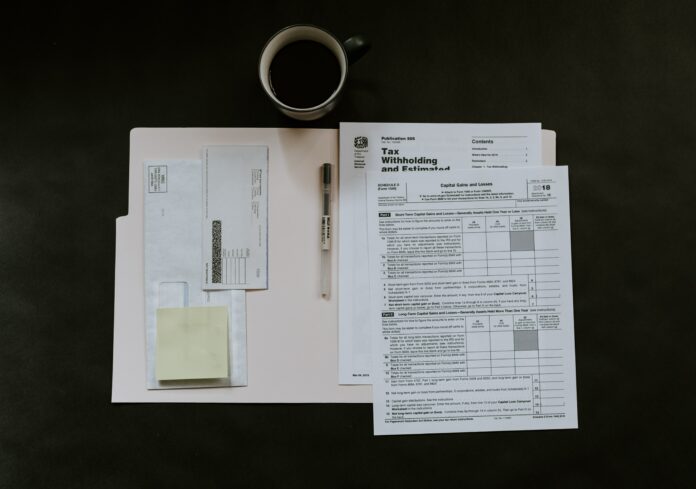With the beginning of a new year, people across the United States are revisiting their current finances. And with the federal tax filing deadline of April 15th just around the corner, taking the time to understand your taxes is especially important.
Whether you will need to make a payment to the government, receive a tax refund or the government, or do nothing at all will depend on a variety of different factors. Hopefully, you have been keeping adequate records of all the income you have generated, as well as documentation of expenses that can potentially be deducted (further explained below). But even if you haven’t been keeping up to date with these finances, we’ll still be able to help you navigate the often-complicated world of paying taxes.
In this guide, we will explain the basics of paying taxes and answer some of the most common tax-related questions. Additionally, we will help you decide whether you should hire an accountant to help with your taxes or elect to do them on your own.
The Basics of Filing Taxes
Since the passing of the Sixteenth Amendment in 1909, most Americans earning income have been required, by law, to pay income tax. All laws regarding federal taxes are initially passed by Congress and are enforced and regulated by the Internal Revenue Service (IRS).
Generally speaking, if you earned an income last year, you need to pay taxes on that income. If you earned it through a traditional employer—one who pays you hourly or with an established salary—then your taxes will likely be calculated using the Form W-9. If your employer has been withholding a portion of your income for taxes (very common), then your tax obligations will likely be low or may even be entitled to a refund. If you are currently self-employed or operating as a sole proprietor, then you might need to file using Form 1040 or one of many other tax forms currently in use.
Tax Brackets
The United States uses marginal tax brackets in order to determine how much money you owe. Every time your income reaches a new level, the rate you pay on each additional dollar—not your total income—will increase. For example, for the first $10,275 you earn, your tax rate will be 10 percent. After that, you will pay 12 percent on every dollar up until you’ve reached $41,775. From there, the rates periodically increase, with a maximum federal marginal tax bracket of 37 percent, which only applies to those earning $539,900 or more.
Tax Deductions
The amount of money you made last year will not necessarily be the same as your taxable income—tax deductions can help lower your total tax obligations. There are many tax deductions currently available, which can help significantly reduce the amount you’ll owe the government. Some of the most commonly used deductions include deductions relating to retirement contributions, charitable donations, mortgage interest, education expenses, self-employment expenses, health expenses, and more.
Other Ways to Lower Your Tax
Tax credits are different from tax deductions and, when available, can help you save even more money. With a tax credit, you can directly decrease the after-tax obligations you will have. Some of the most common tax credits include the Earned Income Tax Credit, the American Opportunity Tax Credit, the Child and Dependent Care Tax Credit, and more. Additionally, you can lower your tax by writing off qualified financial losses from last year or previous years, as well.
Should I Hire an Accountant?
There are literally millions of pages of tax law in effect in the United States. The question is, should you hire an accountant to help you navigate it all?
Pros and Cons of Hiring an Accountant
An accountant can help you know which tax forms you need to file, which incomes need to be reported, and answer the questions you might have. They will often be able to find additional tax deductions and other ways to reduce your financial obligations. Accountants will also help reduce the likelihood of making mistakes while filing taxes, which can help prevent future financial (or even legal) consequences. The biggest drawback of working with an account is that, as you might guess, you will need to pay them.
Average Cost of Hiring an Accountant
On average, hiring an accountant to do your taxes will cost about $200, according to several recent estimates. In many cases, they’ll be able to save you even more on your taxes, making it easier to justify hiring them. Of course, if you have a very complicated tax situation or you run your own business, you will need to pay more for an accountant.
How to Find an Accountant
There are many ways to find an accountant. Searching online (Google) for accountants in your area will typically give you quite a few different choices. Digital accountants, such as those at H&R Block, have also become quite popular. Additionally, you might want to consider asking anyone you know who regularly works with an accountant who they might recommend.
What if I want to File Taxes on My Own?
In the United States, you are not required to use an accountant when filing taxes—you have the right to do so on your own.
Tax Software for Individual Filers
There is quite a bit of software available that makes filing your taxes much easier. TurboTax and QuickBooks are both very popular among people who choose to self-file. Other platforms, such as Credit Karma and more, can also make it much easier for you to self-file. (You can also file taxes by hand, but that will likely make the process take much longer).
Pros and Cons of Self-Filling
The most obvious benefit of self-filing is that you do not need to hire an accountant. You’ll also be able to have total control of your finances, which might be desirable to some people. However, if you don’t know what you are doing, self-filing may end up costing you—mistakes, missed deductions, and missing incomes can all be consequential, especially if you are among the 1 percent of taxpayers audited every year.
Things to Keep in Mind When Filing your Taxes
If you do choose to file your own taxes, there are several things you’ll want to keep in mind. Be sure to keep track of all expenses (online banking makes this easier) and sources of income (work, side hustle, investments, etc.) that accrue over the course of the year. This will help ensure you don’t miss anything on your tax forms. Furthermore, in addition to filing federal taxes, you will also likely need to file state taxes and local taxes, as well.
By keeping these things in mind, you should be ready for the upcoming tax season.
Andrew is a freelance writer that primarily focuses on real estate and finance topics. He graduated from the University of Colorado with degrees in Finance and Political Science and has since worked in the real estate, life insurance, and digital marketing industries. When he is not writing, Andrew enjoys skiing, playing piano, painting, and spending time with his wife (Maggie) and cat (Crow).



